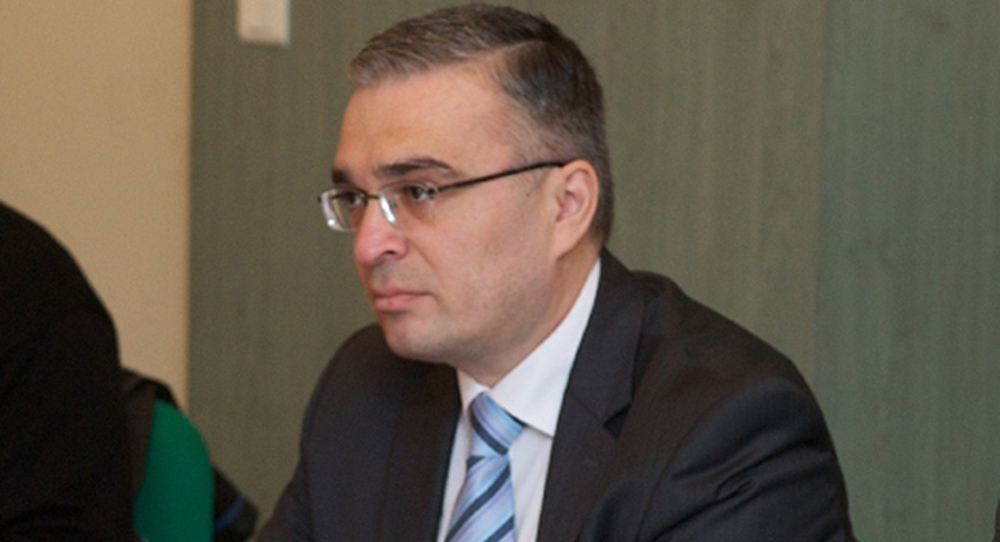Five years ago, on February 4, 2013, Azerbaijani opposition politician Ilgar Mammadov was arrested.
Mammadov had visited the small provincial town of Ismayilli on January 24, the day after a riot that was reported to be directed against an unpopular mayor. Although the street violence was already over and Mammadov said he had gone to the town to see for himself what had happened, he and fellow politician Tofik Yaqublu were detained on the ridiculous charge of inciting the riot. In 2014 they were both given jail sentences.
Mammadov was actually arrested because, as leader of the REAL political party, he was an outspoken critic of the ruling regime and was planning to run for president in elections later that year.
Many other prominent opposition figures, human rights activists, and journalists in Azerbaijan have since been arrested and released—including Yaqublu, who was freed in 2016 after accepting a pardon. Mammadov has stayed in prison. Remarkably, his stature has grown and from his jail cell he is now a figure of great inconvenience for Azerbaijani President Ilham Aliev.
Mammadov is a stubborn man. He has refused the offer of a pardon and of being released to go abroad, even though his conditions of detention are still poor. His wife, Vafa, told me on the telephone from Baku that her husband was no longer being beaten (as he was two years ago) and that his acute back pain had eased. But he is still held in a common cell with 30 other prisoners whose beds are just 5 centimeters apart. The only visitors he is allowed are his lawyer and—twice a month—his wife and daughter, who is about to turn fifteen. But his wife insisted he is in good spirits and as dogged as ever to assert his rights. One of Mammadov’s main complaints is that he would like to get more frequent copies of his favorite magazine, The Economist.
The problem Mammadov poses for President Aliev is analogous to the one that Alexei Navalny (a different sort of personality but of similar standing) poses for Vladimir Putin: he represents a credible alternative to the status quo.
The old, main Azerbaijani opposition parties, Musavat and the Popular Front, which briefly governed the country in 1992-93, have little to offer the public and live off past glories. Indeed, for President Aliev they are a useful contrast to his own regime, which, the public has been told, may have deviated from democracy but has brought prosperity and stability instead.
REAL is more serious. It is staffed by lawyers, like Mammadov, and economists with ideas about how to modernize the economy and democratize the country. It therefore also has a natural appeal for some in the Azerbaijani elite who want to see Western-leaning policies but who are sickened by the colossal corruption in the country.
What’s more, Mammadov may be a modernizer but also happens—something he would not acknowledge so openly—to benefit from Azerbaijan’s clan politics. His father was the head of an influential family from the community known as Yeraz, of Azerbaijanis born in Armenia. If and when Mammadov comes out he therefore stands to inherit a big potential support base and national network.
So to release him now would have the inconvenient effect of having Mammadov at liberty just as Aliev runs for a fourth term (now extended to seven years after constitutional changes) in elections due in October this year.
However, not releasing him also carries costs. The other challenge Mammadov’s case poses is that it has rather belatedly mobilized Europe’s oldest human rights body, the Council of Europe, into action.
Mammadov was arrested just twelve days after the Parliamentary Assembly of the Council of Europe (PACE) voted down a report critical of human rights abuses in Azerbaijan, after intense lobbying from the government in Baku. In retrospect, this dubious vote was the cue for a wave of arrests by a government that could declare its record had been vindicated by PACE.
Evidence has since emerged of what the European Stability Initiative calls “caviar diplomacy”: European parliamentarians allegedly being bought off to support Azerbaijan. For example, one of the key figures in the 2013 PACE vote, Luca Volontè, is facing corruption charges in an Italian court for accepting millions of euros from the Azerbaijani government.
In 2014, the Council of Europe began developing schizophrenic tendencies with regard to Azerbaijan. In May that year, Azerbaijan assumed a six-month chairmanship of the Committee of Ministers of the council—a diplomatic coup by any standards. In the same month, the council’s venerable judicial arm, the European Court of Human Rights, ruled that Mammadov had been prosecuted in order to silence his criticism of the government and should be compensated and released.
The Baku government defied that judgement, but the Council of Europe became increasingly irritated. Secretary General Thorbjørn Jagland became openly critical. Then last year, the Committee of the Ministers invoked a new procedure, instituted in 2010, asking the court, under Article 46.4 of the European Convention on Human Rights, to decide whether Azerbaijan’s failure to implement the judgment on Mammadov “represents a further violation of the convention”—and therefore lays them open to punishment.
That process is now underway. All sides are giving their comments to the court’s Grand Chamber over the next month before it meets again. Eventually, if Mammadov is not released, the Council of Europe could take the humiliating step of suspending Azerbaijan’s voting rights or even expelling the country from the organization altogether.
The Council of Europe knows that its authority is on the line over the Mammadov case. That is because of the widespread perception that Azerbaijan has manipulated the organization, but also because it faces even sterner tests with Russia and Turkey over the coming year and needs to assert its credibility.
That is one reason why, strangely enough, in the face-off between Azerbaijan president and prisoner, the prisoner now has greater authority.
Photo credit: Council of Europe.




.jpg)

.jpg)